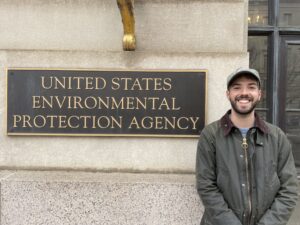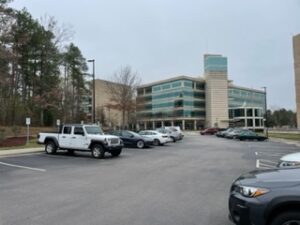This post was written by current MPA student, Stephen Thompson.
———————————————————————————————-
On January 6th, 2021 a group of protesters gathered around the US Capital Building and attempted to gain access to the building to disrupt the American democratic process. That was a significant day in American History. The recent anniversary of this pivotal date has me thinking about the current state of the American society. I’ll stop myself short of a soap box rant (I promise), but I think this incident brings some larger issues to light that are happening in our contemporary society which are about, or at least affected by government, both federal and local. There are some extreme views about this event, what it says, what it means, and what it was, which I want to steer clear of, given the divisiveness of online blogs. So, lets just look at some implications that this event might indicate about how citizens interact with their government.

I grew up in Northern Virginia, about 40 miles from Washington, DC. I went to the National Mall, Smithsonian Museums, and other federal buildings on numerous field trips starting in middle school. My father worked in the Pentagon, which I visited many times growing up, and whenever relatives came to visit it seemed like we all had to pile into my family’s minivan to give an impromptu tour of the nation’s capital (cue impression of bus megaphone: On your left is the Lincoln Memorial!). As a child I complained to my mom, “Why do we have to do this every time someone comes to visit us?” My mom would patiently explain to me, “Not everyone is lucky enough to live so close to the Capital. Some people only get to see these places once in their life.” I would think to myself, “I wish I was one of those people…” As I got older, I understood what she meant, and I was able to take advantage of my proximity to DC. I learned that Washington, DC is a real place, and the people who work for the federal government are real people.
As my mom keenly pointed out, many American citizens only get to visit DC one time in their life, let along visit enough to have a season pass at the museums or learn the incredibly confusion naming devises used in the spoke-wheel layout of the streets (designed to confuse invading armies and 18-year-old going to concerts at the 9:30 club). It saddens me that for many of the protesters who attended the January 6th protest and subsequent insurrection event, this might have been their one visit to the Capital. For some, they may only have been familiar with the layout of the city from playing the post-apocalyptic, first-person shooter game, Fallout 3. Perhaps, to some they felt like they were playing a game, because the government is such a distant concept to a lot of Americans. To many Americans, government is an ephemeral group of people who make decisions that both heavily impact and hardly reflect the everyday lives of ordinary people.
Even as an MPA student I can admit, sometime the notions of legislation, congressional approval, executive orders, and federal oversight are too big and cumulous-like to grasp. I am glad I have my pervious experiences to fall back on, during the seemingly never-ending political debates around economic stimulus plans, infrastructure investment proposals, regulatory oversight discussions, and pandemic management ideas. For someone who hasn’t ever been to Washington, DC, who hasn’t ever met a federal worker; doesn’t know anyone who works for Congress, I could certainly understand how they might disassociate the federal government from “reality.” With all the political divisions over the last several years, the chaos of the pandemic, and the incendiary rhetoric of message board radicals, it isn’t hard to see how someone could feel very angry, scared, and helpless against the government.
“Against the government.” That’s how those persons felt on that Wednesday. They were so disassociated with the democratic process, they felt like the government was against the people; not for, by, and of the people. Please don’t misinterpret my sympathy for disenfranchised people with agreement or justification of their actions. What happened at the Capital on January 6th, 2021 was not democracy, was not civilized discourse, and was not acceptable, however, I think it was symptomatic of a greater problem in American society. –And addressing problems in our society is one of the jobs of the American Government. Now, I don’t mean to say that those involved in the Assault on the Capital shouldn’t be punished, and justice shouldn’t be delivered for an egregious affront to American Democracy, but once the sentences are passed out, there is more work to be done. We, all Americans have more work to do. We need to both embrace the imperfect system of Democracy and to improve that system. We need to remind ourselves that government is made up of us. It is not an “Us vs. Them” thing. It’s a “we for us” thing, and that starts by talking to our neighbors, co-workers, and community members. Volunteering at polling sights on election days, speaking our minds and listening to one another. Democracy is messy and consensus is hard to achieve, but the alternative is what we saw on that infamous Wednesday in 2021. The alternative isn’t an option.
In reflection, I don’t think we’re “too far gone,” and I don’t think those domestic terrorists represent any significant portion of the US population, but I do think they are a wake-up call. We can’t turn away, isolate, and ignore the divisions between us any longer. It is time to talk, listen, and learn from one another. So, to paraphrase Mr. Rogers, “Won’t you be my neighbor [and make our national a better neighborhood].”










 Breaking this down we can see how this question of “what can and what can’t teachers tell children?” lands in all four areas. Liberty; Everyone should be able to say whatever they want, using their own personal discretion as to what is and isn’t appropriate for the situation. Community; but maybe what doesn’t offend me, is downright vulgar to you, so maybe let’s agree on some basic standards. Prosperity; in order for children to succeed they need the best education for them, which may include parents and guardians teaching some topics in more intimate environments. Equality; on the other hand, maybe we should lay some basic groundwork down to ensure everyone knows at least the bare minimum on commonly discussed topics. [Wow, that was a head jerker].
Breaking this down we can see how this question of “what can and what can’t teachers tell children?” lands in all four areas. Liberty; Everyone should be able to say whatever they want, using their own personal discretion as to what is and isn’t appropriate for the situation. Community; but maybe what doesn’t offend me, is downright vulgar to you, so maybe let’s agree on some basic standards. Prosperity; in order for children to succeed they need the best education for them, which may include parents and guardians teaching some topics in more intimate environments. Equality; on the other hand, maybe we should lay some basic groundwork down to ensure everyone knows at least the bare minimum on commonly discussed topics. [Wow, that was a head jerker]. 
 After the excitement of the holidays has begun to dissipate, and the novelty of seeing my extended family has all but worn off, my attention is beginning to turn to the upcoming Spring Semester. If you’re in a similar situation, you know the exhaustion of doing all the things you never have time for, mixed with fatigue from baking, social engagements, cooking, pre-holiday shopping, family time, post-holiday sales, and more social engagements with the family. Now, we find ourselves ramping up for the new year [When does the vacationing start on Winter Vacation?]. The MPA program’s focus on Leadership and self-development has me thinking about the tradition of resolutions. If you’re feeling intimidated about coming up with a resolution for 2022 [“2020, Two” I’ve heard it called], I wanted to pass on some sage wisdom I’ve learned regarding self-improvement plans. Here are three tips for setting goals/resolutions for the new year.
After the excitement of the holidays has begun to dissipate, and the novelty of seeing my extended family has all but worn off, my attention is beginning to turn to the upcoming Spring Semester. If you’re in a similar situation, you know the exhaustion of doing all the things you never have time for, mixed with fatigue from baking, social engagements, cooking, pre-holiday shopping, family time, post-holiday sales, and more social engagements with the family. Now, we find ourselves ramping up for the new year [When does the vacationing start on Winter Vacation?]. The MPA program’s focus on Leadership and self-development has me thinking about the tradition of resolutions. If you’re feeling intimidated about coming up with a resolution for 2022 [“2020, Two” I’ve heard it called], I wanted to pass on some sage wisdom I’ve learned regarding self-improvement plans. Here are three tips for setting goals/resolutions for the new year. 

